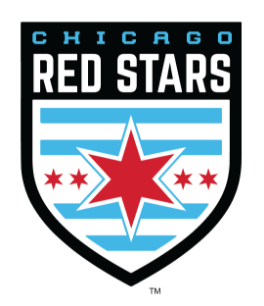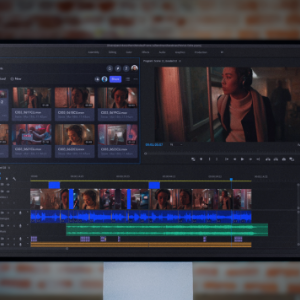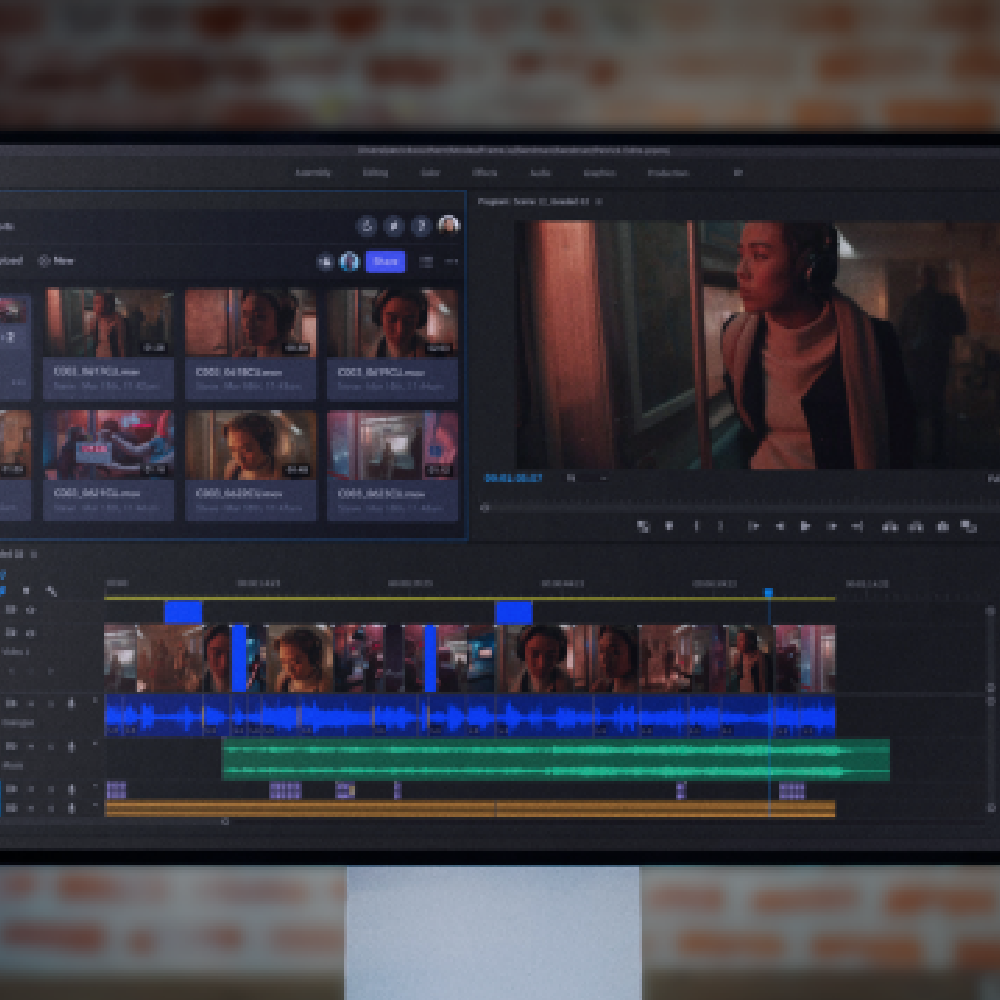
Chris Petrucelli
Former Head Coach
Teamwork and sports go hand in hand. But professional sports teams are also businesses — and in business, cross-functional collaboration is the key to success.
From the players and coaches to the marketing and business teams, the Chicago Red Stars have found that trust, integrity, and authenticity are the winning strategy for effective teamwork.
In this episode, former Head Coach Chris Petrucelli and Director of Marketing and Communications Rachel Parrish give us the play-by-play on how teamwork has kept the Red Stars bonded together since their start in the inaugural season of the National Women’s Soccer League.
We unpack the team’s common-goal mentality on the pitch, how the marketing team aims for a more authentic brand approach to connect with fans, and how the contributions of each arm of the organization are essential to winning. We even get a behind-the-scenes look at how the team’s skillful footwork helped them work together to choreograph a dance video.
As the champion of teamwork, Adobe is changing the world through digital experiences. Empower your team to do its best work through Adobe solutions — learn how in the webinars below.
Show notes
The Power of Teamwork is brought to you by Adobe and hosted by Claire Craig.
Disclaimer: The views and opinions expressed by guests are their own and their appearance on this podcast does not imply an endorsement of them or any entity they represent.
Teamwork and sports go hand in hand. But professional sports teams are also businesses — and in business, cross-functional collaboration is the key to success.
From the players and coaches to the marketing and business teams, the Chicago Red Stars have found that trust, integrity, and authenticity are the winning strategy for effective teamwork.
In this episode, former Head Coach Chris Petrucelli and Director of Marketing and Communications Rachel Parrish give us the play-by-play on how teamwork has kept the Red Stars bonded together since their start in the inaugural season of the National Women’s Soccer League.
We unpack the team’s common-goal mentality on the pitch, how the marketing team aims for a more authentic brand approach to connect with fans, and how the contributions of each arm of the organization are essential to winning. We even get a behind-the-scenes look at how the team’s skillful footwork helped them work together to choreograph a dance video.
As the champion of teamwork, Adobe is changing the world through digital experiences. Empower your team to do its best work through Adobe solutions — learn how in the webinars below.
Show notes
The Power of Teamwork is brought to you by Adobe and hosted by Claire Craig.
Disclaimer: The views and opinions expressed by guests are their own and their appearance on this podcast does not imply an endorsement of them or any entity they represent.
The Power of Teamwork Season 2, Episode 5
“A Playbook on Trust and Resilience” — Chicago Red Stars
Host: Claire Craig, Organizational Development Specialist, Adobe
Guests: Rachel Parrish, Director of Marketing & Communications, Chicago Red Stars
Chris Petrucelli, Former Head Coach, Chicago Red Stars
Rachel Parrish
Everything’s not going to be flowers and daisies. None of us are perfect. I always say to anyone I work with, I’m not above feedback. I’m not above constructive criticism. And I ask that of the people that I work with as well. Because the only way that we get better is if we have that feedback loop that’s open and honest communication.
Claire Craig
Hi everyone. Welcome back to The Power of Teamwork. I’m your host, Claire Craig, and today we’re really excited to get into the spirit of teamwork because we have our first-ever sports team on the podcast.
Now we know teamwork and sports go hand in hand, but sports teams are also businesses — and in business, it’s really important to be able to break down silos and work collaboratively across the organization.
So we sat down with the Chicago Red Stars earlier this season, one of the longest standing clubs in US women’s professional soccer. I’m so excited to welcome former Red Stars head coach Chris Petrucelli and Director of Marketing Communications Rachel Parrish. Thank you both for being here.
Rachel Parrish
Thanks for having us.
Chris Petrucelli
Yeah, excited to be here.
Claire Craig
Oh, yes, I’m so excited to have both of you. So, let’s start by getting to know you both a little bit. Rachel, let’s start with you. Tell me your journey about how you got to where you are.
Rachel Parrish
Yeah, I’d love to share. I have always been an avid sports fan. Growing up, I watched Real Sports with Bryant Gumbel, with my dad. I’m from the Chicago area, so watching the Bulls dynasty, and also from Naperville specifically, so watching Candace Parker growing up. So I think that seed was just planted in me very early. Right out of school, I went to school, University of Missouri for communications, and right out of school I started working in sports.
I’ve had a pretty long journey over the last 10 years. Like I said, growing up watching the Bulls. I also remember watching Jenny Finch when she first came to Chicago and played for the Bandits. I always wanted Chicago to have a very strong women’s sports base. So I found myself here at the Red Stars.
I started last year in January 2022, and it has been an experience unlike any other. I think the opportunity that it’s presented for both myself and an impact for young girls like I was in the city, has been amazing.
Claire Craig
Awesome story. I feel like I want to jump in and live your whole life with you over again. It was a rollercoaster. Okay, Coach, over to you, tell me a little bit about your journey to get where you are.
Chris Petrucelli
I grew up in New Jersey, just outside of New York City, playing multiple sports. I grew up playing, went to college, and played college soccer at North Carolina Greensboro. When I graduated from college with a degree in marketing, I had the chance to work in business or had a chance to coach for free and not get paid.
And I actually chose not to get paid. And I started coaching at Old Dominion University as a volunteer coach. My job that paid me was I worked in a tea factory and basically drove a forklift and I would come home just covered in tea, and then I would go to practice. And from there, I was able to become a full-time coach.
I was offered a job at Notre Dame just starting a women’s soccer program but my position when I first got there was assistant men’s coach and the head women’s coach. I thought I was going to go there for a year and then just become a men’s coach full time, but I really enjoyed coaching on the women’s side so I decided just to take the role as the women’s soccer coach there.
So I coached there for about 10 years or so, 12 years. Just about maybe a year and a half ago, I got a call from my agent and he said, “Hey, would you be interested in coaching in the professional league?” And my first response was, “No, I’m a college coach. That’s what I’ve done. That’s who I am. It’s what I’ve done for close to 40 years.” Then he called again, and he called again, and he called again and was really pushing on this position with the Red Stars.
And after a number of conversations, I thought it just made sense in my career progression to take a stab at a higher level even than where I was. So that brought me to the Red Stars about a year and a half ago.
Claire Craig
Wow. What a journey. So you’ve coached pretty much all over the country. What do you think about coaching in the Windy City?
Chris Petrucelli
When you get it going, it is fun, exciting, enthusiastic people who demand excellence. It’s what people want and what we’re certainly striving for.
Claire Craig
I love that, and I love that it’s a really unique fan base in that way. It’s not just “Oh, we want our teams to be okay.” Your fans want you to be the best, and I love that.
Rachel, can you tell me a little bit about the history of the club? We mentioned it’s one of the oldest in the country, but can you tell me more about the history of the club?
Rachel Parrish
Yeah, absolutely. I think one thing that’s unique about the Red Stars, to your point, is we’ve had almost every major player that you could think of come through Chicago.
Megan Rapinoe once played here. It’s a great hidden gem in my mind. I think the opportunity to grow through so many different areas of change and so many different seasons within women’s sports and growing this professional organization to where it’s at now towards speaking about even more expansion has been great. And I think it’s vital to the team’s success.
Claire Craig
Yeah. And I think that’s really interesting because you’ve seen the iterations of how really the organization has grown and changed over time. And I know you both work obviously in different parts of the organization, but teamwork has to be essential to what you both do.
So how would you say teamwork really shows up in the work you do every day? Coach, let’s start with you.
Chris Petrucelli
I coach the team, it’s obviously a very important piece of what we do. And in order for us to be successful, first, beyond just on the field, we have to have a staff that’s organized, prepared, and ready to go.
So the role of the staff is to make it so the players only have to worry about playing soccer. They should not have to worry about anything else. We’re talking about 27 players that have to be on the same page in order to be successful. And in our game where you can’t just take the ball and run up the field by yourself, it’s just not possible. So everybody has a job to do, but those jobs all have to be coordinated.
Everybody has to think the same way. And that takes time to really put that together, to get everybody thinking the same way. There’s a certain way that we want to play. There’s a certain way we want it to look. There’s a certain way we want the players to move, and in coordination as well. And that takes hours and hours of work.
But it also takes a good deal of trust. If I’m on the field, I have to trust that my teammate is going to be in the spot they’re supposed to be. Because I’m going to pass the ball there, you know, and if they’re not there, the other team’s getting the ball.
We really have to be coordinated, and we have to be coordinated as a group of 11 and also then as the whole group of 27 because you never know on the day who’s going to play and even where they’re going to play — big piece of what we do.
Claire Craig
Yeah, so what I’m hearing is that teamwork is first and foremost about trust. And that’s so key because that really starts with you, Coach. For our listeners, we trust that you’ll stay with us for more with the Chicago Red Stars.
Welcome back. This is The Power of Teamwork. We’re talking with the Chicago Red Stars former Head Coach Chris Petrocelli and Director of Marketing and Communications Rachel Parrish.
Rachel, working in an organization at this level, I would guess that you don’t get where you are without being highly competitive. So how do you navigate and bring that out in a positive way that doesn’t cause crazy conflict?
Rachel Parrish
This year we transitioned our creative to show more grit in our photos, showing more of the muscle striations in the athletes’ legs so that when an action shot looks like an action shot, you can see just how hard they’re going, how fast they’re going.
And I think being able to translate our creative with the attitude and the mentality of our athletes has been a winning combination for us in terms of being able to grow the fan base and being able to really work in tandem with the team side to build a home team advantage. And to your previous question, I think that’s a big part of teamwork in terms of collaboration from the front office and the team side is working together to build a fan base because you don’t have a home team advantage if you don’t have fans that are showing up cheering you on more than the other team.
And I think Coach has done a great job of creating an environment where we are dedicated to excellence and working on that every single day.
And so It’s also my part on the marketing end to make sure that connection is made in an authentic way where our fan base in Chicago, who responds really well to unapologetic greatness, they’re able to tap into that.
Claire Craig
Unapologetic greatness. I love it. I think I’ve come up with my new personal tagline. That’s amazing.
So I want to know a little bit more about that theme, Coach, through your eyes. So you have these 27 very talented players who are gritty, who are tough, who are really committed to being the best they can be.
How do you build and foster trust, especially through difficulties or the inevitable times where you’re going to have lows or highs?
How do you build that trust?
Chris Petrucelli
The first piece is just building a relationship and from our end or from the staff’s end, we have to build relationships with the players and we have to follow through. If we talk to a player and we say, “Hey, you know, we’re going to talk about the possibility of you maybe going out on loan and playing somewhere else for the next six months to get you more playing time” and things like that, we have to follow through. We have to make that happen. If we don’t make that happen, why would they trust us? So we gotta keep our word for sure. And that’s in all parts. Look, if we say, “Hey, we’re going to have 10,000 people at the game this weekend,” we better have 10,000 people at the game because players are counting on that.
I think following through is a really important part of trust. And then, we all have to be a little bit open-minded. When I walked in from the beginning, just to allow yourself a little bit of leeway, and maybe let’s start from a place where you’re willing you know, to trust some people and give them a chance and see what they can do.
Now, if we don’t keep up our end, I understand why someone would not feel good about that. But I think the players have to be open-minded and willing, and then we have to work hard at it and we have to work at it every day.
Claire Craig
Yeah, that’s really a great teamwork takeaway. It’s something that you’ve got to work at every single day. It’s that type of work in progress. You can’t let your guard down type of thing. And one thing that you said that I want to highlight is that it’s a good idea to be authentic. In fact, it’s essential if you want to build these types of relationships.
So Rachel, how do you really grow that trust through authenticity? And what advice would you give to our audience?
Rachel Parrish
The first step to building trust through authenticity is understanding what your priorities are as a brand. Coming into the Red Stars, our priority was to clearly communicate and authentically message exactly where we were at and that we may not know where our immediate future is going in terms of navigating through a challenging situation, but our overall goal was to build a strong women’s sports team in Chicago, bring women’s soccer to the forefront.
And any brand can connect with being able to clearly communicate and clearly message to your stakeholders exactly what your intentions are and exactly what your priorities are — and once you’ve messaged that, then keeping them in the loop as to ways that you have achieved those goals.
I think a big mistake that brand marketers can sometimes make is having these grandiose ideas, giving these big KPIs at the beginning of the year saying, “Oh, we’re going to reach this or oh, we’re going to donate $500,000 to this cause and end world hunger,” and then they don’t tell anyone else the rest of the year or the rest of that campaign exactly what they’ve done and how they’ve done it. That’s where you break trust. And to Chris’s point, I think that translates through directly with any person who has a human interest in something and whether that’s in purchasing or becoming a repeat customer.
So in our case, a season ticket member, and I will say our season ticket members have been great about keeping us honest, and it’s really helped us see what type of messaging is going to move the needle in terms of honesty and integrity, and how much is enough while also understanding that sometimes we don’t have answers because when you’re in a fluid situation like we’ve been, you have to be flexible from day to day.
So it’s been very important and impactful to be able to sit down and really translate authentic messaging and to be able to have that translate through to our audiences across the way because outside of our season ticket members, we also have corporate sponsors who have their own interests who invested in us for their own reasons.
So making sure that your messaging is clear and that you’re also bringing people through that journey.
Claire Craig
Yeah, I really love that. And especially you talk about the concept of having basically a North Star so everyone can work toward this goal and be clear on it, no matter where they are in the organization. And that allows for a lot of consistency, which I think you highlighted perfectly. That’s how trust is translated to the broader audience. If you can be consistent about your messaging, consistent about how you show up and how you communicate around it, to your point, you know, it doesn’t do any good to set a grandiose plan and then have no follow through.
And your audience is like, “The heck?” So I love that you called that out and how important that is to grow and develop trust, both on the team but also in your fan base and above.
So Coach, as an individual, we all know we experience wins and losses in life. That’s just the way life works. So how do you recenter your team after a loss, and what advice would you give to our listeners about how to bounce back?
Chris Petrucelli
I think sport is a great example of how you have to fail. In order to succeed, you have to fall down to get up. So if you look at the history of team sport in particular, most every team that’s won a championship didn’t win a championship for a while.
It took time. It took bad years. It took a lot of bad things to happen before they could recenter themselves and get moving forward. And we play a game that is 90% failure.
We talk a lot about the next one, not what happened before but what’s going to happen next to try to get the focus off of the negative and get the focus on how we are going to be successful with the next one.
You’re going to have adversity along the way, you’re going to have sort of these lightning bolts that strike, and it’s more about your response to failure than it is celebrating the success because you’re always going to have this failure.
So we have to do a really good job of thinking about let’s move on to the next one. And then when it does get right, you better enjoy it.
Claire Craig
I think that’s really well said. That reaction piece that it’s not about trying to avoid failure because actually failure is a necessary component to success. It’s about how you respond when that happens, how do you take what lesson came from that and apply it going forward?
And you also said something that I want to point out to our audience, because it’s not something we do well, I think, as people. You said, “When the winds come, or when the good moments come, take a minute to celebrate that.”
And I think that’s really important because people are often, especially if they’re high achievers or they’re competitive, they’re like, “Onto the next, what’s the next goal? What’s the next thing I can do?” What we find from a lot of studies is that it leads to burnout over time. If you never take a moment to really celebrate when things go well, you never get a moment to really sit in that and be propelled to be inspired to do the next great thing.
Chris Petrucelli
Yeah, we have a 24-hour rule. 24 hours after a match, you celebrate the match or you drown in your sorrows, whatever it is. But after 24 hours, you’re moving on to the next one, right? You’re not focused on the last one.
Claire Craig
I love that. 24 hours. I’m going to apply that to the next time my toddler has a meltdown.
Just be sad for 24 hours.
Chris Petrucelli
24 hours is a long way with that.
Claire Craig
Yes, that’s a long time. We’re going to take a short break while we think about that 24-hour rule. Stay with us.
We’re talking with the director of marketing and communications and former Red Stars head coach about how failure and success are natural parts of the growth of their team. Now, I imagine this produces a lot of opportunities to build resilience, especially during change, which is something that we’ve all experienced a lot of — you know, when things are not going exactly as planned. So, Rachel, how do you handle change from the business side of things?
Rachel Parrish
Handling change on the business side really just comes down to being able to clearly communicate and understand, again, what your priority is as an organization. Obviously, for our org, it’s butts in seats. Ticket revenue is really what helps the club grow. But you can’t build a fan base and you can’t have trust if you don’t clearly communicate what it is that people are investing in, even through that change. So one thing that we dove into this year is we’re acknowledging that we are rebuilding our foundation as an organization.
It was shaken a bit last season, but we’re able to lay the foundational brickwork, and if people are getting in at the ground level, they’re able to be a part of that. That translates through to fans, that translates through to our corporate sponsors, and so they have a very clear vision that, to Chris’s point, we’re not perfect, and we’re in the middle of big change, and things aren’t always going to be right.
But we are clear, and we’re honest with where we’re at as an organization and at any point you know exactly what you’re getting from us in that aspect. And I also did want to say that through change comes resilience and you can’t as an organization build resilience without having gone through adversity.
Claire Craig
What you both showcase so well is that there are things in life that are controllables, and there are always uncontrollables. And what you can control is the work that you do, how you show up, your attitude, the trust that you’re able to build. And then when the inevitable uncontrollables come at you, if you do those things well, you are able to navigate them so much more successfully. Your team has trust that you are all working toward the same goal. And as an organization, you can clearly say, “This is where we’re going and this is how we’re going to continue to show up.”
So we are going to talk about a spooky but fun little campaign. Rachel, do you want to talk to me a little bit about Wednesday Addams?
Rachel Parrish
I would love to. Our Wednesday Addams schedule release was one of our most successful pieces of content that we put out this season. And it’s a true example of teamwork and collaboration and trust coming together to make something beautiful and organic.
One of the players on the team, Erin Wright, approached me in the midst of the Wednesday Addams on Netflix series being very popular, and she threw the idea out, wouldn’t it be cool if we did a piece of content around it?
We didn’t have a specific use in mind, just something that would be cool. She rallied in a few players. I think it started off with maybe four or five on their end who were just learning the moves. It was during their break, more so in their free time. And at the time we were in between offices, we were about to move into our now main office and we were in a temporary space.
So we had very limited resources just because of the change that we were experiencing as a club. We were able to rally both sides together, our in-house content team went out, rented a disco ball. I have no idea to this day where they sourced it, but they rented a disco ball, had a whole production set up in the middle of an empty conference space, and ordered our outfits online, and we created the piece of content that eventually became the Wednesday Addams video.
And how it became this living thing that it is now, during the time of us going back and forth with the creative idea, I learned that the league’s schedule release timeline was going to happen on a Wednesday. And organically, I said, “Okay, you all, this might sound insane, but we have to shoot, edit, and turn this around in eight days in order to make the timeline to launch on Wednesday in time.”
And our team is so amazing. They’re very dedicated, incredibly talented human beings. The players took that same competitive mindset as you can imagine to learning the dance moves and coming up with the creative look and feel that they wanted to bring to it. And it all came together for a very successful launch.
We got over 228 million media impressions and also over 700,000 views on Twitter and IG alone from a piece of content that just came from a fun idea, ability to collaborate and having that good relationship and open lines of communication between front office and team side.
Claire Craig
And the real question is, Coach, do you know the dance? Would you like to do it right now? Just kidding.
Chris Petrucelli
To be honest with you, I only remember Wednesday Addams from The Addams Family show 30 years ago. And then I really knew nothing about this until it came out. The players, they never mentioned it. They never said that they were putting this whole thing together.
And I guess part of it was, it was part of the secret of the whole thing. And the interesting thing is, I’m not sure that this would have happened even a year ago. I felt like when I first came in, the players were very guarded and didn’t really interact much outside of the team. And I think they’ve taken, and again, we talked about them starting to trust people and having to open their minds a little bit and allow some people in.
I think this is a result of them going, “Okay, look, I’m going to give these people a chance,” and once they gave them a chance, they ran with it and wow, what a wonderful advertisement it was. And obviously the numbers are through the roof. So credit to everybody for putting together a great campaign.
Claire Craig
Yeah, I love that. And I think what that highlights, which is super applicable to our audience, is the power of breaking down silos, right? Because you have separate functions, obviously, but when you’re able to work cross-functionally, look at what an amazing product you were able to produce.
So Rachel, what tips would you give for an audience who is really interested in fostering that in their team? Maybe they have teams that work in different parts of the organization who don’t really collaborate or work together. What is like one golden nugget tip that you would give them if they want to foster that cross-collaboration?
Rachel Parrish
You have to have a feedback loop. To Chris’s point. I don’t think we get to this place if people who are dedicated to hearing feedback and being receptive to it and acting on that feedback to help break down those silos did not happen.
And everything that you hear in that feedback loop is not going to be what you want to. Everything’s not going to be flowers and daisies. None of us are perfect. I always say to anyone I work with, I’m not above feedback. I’m not above constructive criticism, and I ask that of the people that I work with as well because the only way that we get better is if we have that feedback loop that’s open and honest communication that gets us to the common goal.
And I think having that feedback loop amongst the team side, not just with players, but with coaches, having to understand opportunities that make sense when they do and when they don’t, especially working in a field where you’re working with human collateral. I always hate that phrase because obviously humans are humans, but if you look at it from a business sense, right, I’m looking at the product on the field.
How are we marketing the product on the field? And I’m also looking at player marketing. How are we marketing our players? And through the player marketing, I have to understand what their core values are, what makes them tick, what are the things they like to do in the community, and then how can I take that feedback and create a product that we can market to our audience that makes sense in the most authentic way.
And I don’t get that unless I’m able to have an open feedback loop.
Claire Craig
Yeah, I think that’s really well said. And you both have alluded to this earlier in our talk today, but really about the importance of fans and how they truly are who you are working to serve. Nothing works if you have no fans, right? So you really need to show up for them in a key way.
So Coach, I’d love to hear from you on this topic more about the fans. What do you think their impact is on teamwork?
Chris Petrucelli
We had a meeting with the front office, everybody involved, [but] the players were not involved. And one of the things that I, when I got a chance to speak to the whole group, I talked about the game day atmosphere, how important the game day atmosphere is.
And all of a sudden, it’s changed. It’s different now, the game day atmosphere. The game day atmosphere is now loud, supportive. It pulls the players along. And the fans can help you win a game. They can pick a team up when maybe things aren’t going so well. They can get a team over the line at the end where maybe you’re just holding on and trying to protect the game, protect the lead, and trying to win the game.
It’s important for us to engage those fans, to have them as part of the game. And I think we’re doing a better and better job every match of having them involved. And again, that goes back to the marketing group. It goes back to our whole front office. It’s a club-wide initiative that is working. I see it working.
I hear it. I feel it. You can feel the energy in the stadium. And when we go away and we play at some of these places and there’s 25,000 people and they’re all against you, you feel that as well. You know that it’s even harder that way. So we want it to be harder for teams when they come in here.
Claire Craig
Absolutely. I feel like this is a phenomenon that’s really picked up over the last 10, 15 years, this idea of a really, I mean, there’s always been the concept of like home-court advantage, obviously, but definitely there is such a power when you can grow that fan collective to really be that X factor when you go and compete.
Coach, can I hear a story that stands out in your mind when it comes to the fans?
Chris Petrucelli
When you step into our environment, into our stadium, I think you feel the energy immediately when you come out of the tunnel. There’s this entrance for the players. It’s like the gladiators are coming out into the Coliseum, and they’re coming through the tunnel. And you can just feel the energy in the stadium when the players come through. And a lot of it is, we have a lot of families, kids, things like that. And they’re just so over the moon that they’re getting a chance to see their heroes because that’s what these guys are for many kids out there.
These guys are the highest level players in the world, then obviously there’s the game, but after the game, there’s such a connection between our players and the fan base. Some of them spent close to an hour after the game signing autographs, just talking to people, everybody comes down, gets as close to the field as they can, and they just interact with the fans for a good amount of time, and you’ll see all of them.
All of our players are doing it, whether it’s the biggest star or the player that’s on the end of the bench. And no one tells them to do that. We’ve never had to say to them, “Hey, go sign autographs” or anything like that. They all do that on their own because I think they really appreciate the fact that there’s actually people who really care about what I do.
And a lot of them — because look, for a long time in our sport, the crowds were small, and you didn’t have these great environments and great stadiums and all of that. And now, I think they really do appreciate the fact that there are people there.
Rachel Parrish
To your point, Chris, I think, if anything, I have to push them off the field. Like, I have to say, “Okay, guys, the stadium is closing. It’s time to go.” But you bring up a great point. In a business sense, we have one of the most accessible products in sports. And I think that helps make us very unique. You don’t go to a Bulls game or Bears game and see all of the players, from the starters all the way down, coming out and signing autographs for each and every single fan.
And that is something that helps us be able to humanize what it is that we’re doing. It takes this very big competitive machine and gives it arms and legs to reach through to people, which I think has made it very valuable and is one of the reasons why women’s soccer is growing so much in America right now.
Claire Craig
And to your point, these athletes are not only incredible at what they do but really these public figures now that people are looking up to. And I don’t know about you, but it is such a defining moment when you meet someone that you look up to and they’re actually as great as you’ve built them up to be.
Rachel Parrish
Oh my goodness, yes. They say don’t meet your heroes, but I can say time and time again after the game, I see so many people meeting their heroes and they are pleased. You can see the look in their eyes. I did see one game where there was a little girl who had a sign that said, “Alyssa [Naeher], You’re my hero.” And when Alyssa came up to sign it, the girl broke out in tears.
She was almost crying too hard to be able to take the photo. But the next two home games I saw this same girl sitting there, same sign, and I could just see the making of something special, whatever she decides to grow and be. I think that’s the first iteration of seeing that what might be impossible is possible, and that little flare of magic is also what makes professional sports in particular so special to people.
Claire Craig
Oh, I’m over here getting teary-eyed at that story. It’s so sweet and so powerful. Thank you both so much for being here.
Chris Petrucelli
Thank you.
Rachel Parrish
Thank you.
Claire Craig
Oh, lots of crucial takeaways are kicking around in my head. First, trust is key to teamwork and embracing change and developing resilience is so core to building a strong organization.
Knowing what you can control and that there’s a distinct power in breaking down silos and collaborating across an organization. And thanks to all of you for listening to this episode. Let’s team up again soon.












